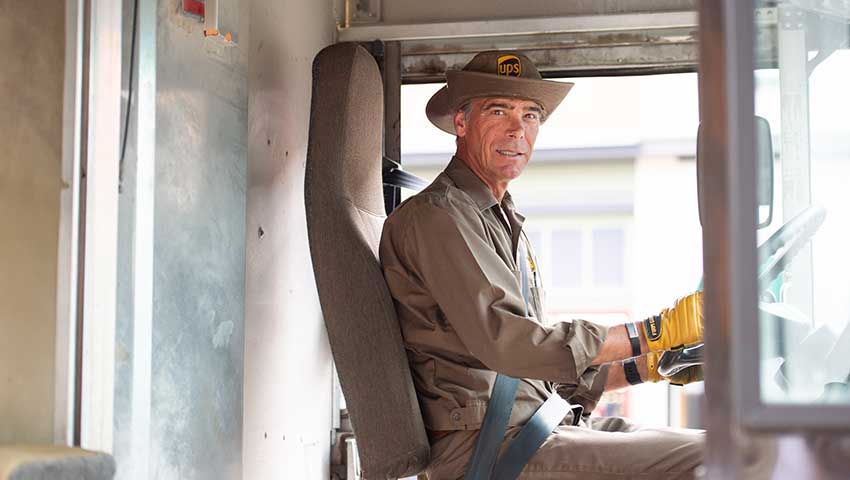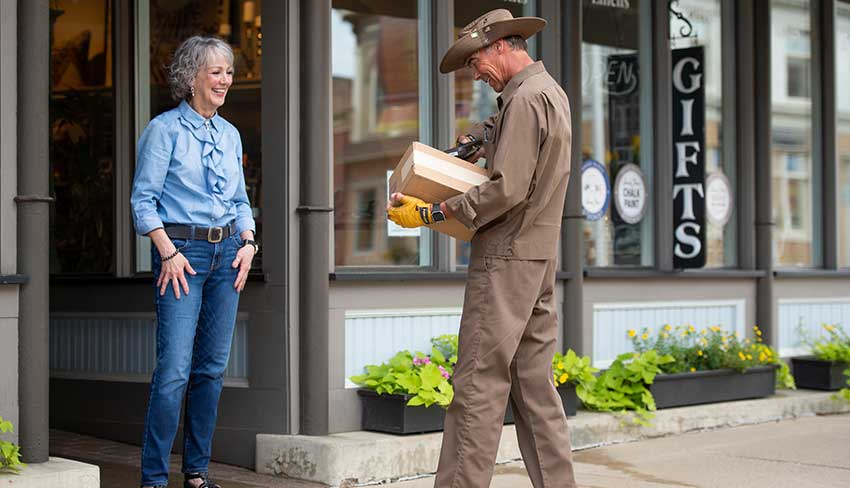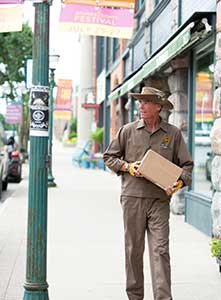Bladder Cancer Survivor Mentors Others with Bladder Cancer
Delivering more than packages helps one bladder cancer patient find positivity and enrichment

photo credit: Edda Pacifica
Kevin Harrington loves his job delivering packages for United Parcel Service Inc. The 52-year-old husband and father of two from Howell, Michigan, is also a safety co-chair, training other drivers on the UPS mantra to stay safe “one stop at a time.” He applies the same philosophy to another important role: mentoring newly diagnosed bladder cancer patients at the University of Michigan Rogel Cancer Center.
"With safety, you have to play the odds," Harrington says. "At UPS, you do everything possible to get home safely from your last stop. In my cancer situation, I made the decisions that would give me the most longevity."
Diagnosed with pT2N1 bladder cancer in 2017, these choices have not been easy. But for Harrington, having his bladder surgically removed, participating in an immunotherapy clinical trial, continuing to work to stay active and educating others on early detection of bladder cancer are crucial.
"I can't do anything about what's going on inside my body," Harrington says. "But if you sit back and feel sorry for yourself, cancer is winning. I wasn't going to let cancer win."
Early Signs and Symptoms of Bladder Cancer
Harrington begins his workdays at the UPS package distribution center in Howell. After a morning huddle and stretches to prepare for the active job of package delivery, he heads to the picturesque town of Chelsea to begin his route.
He had noticed a frequent and persistent urge to urinate -- far more than normal -- but weeks passed with Harrington trying over-the-counter remedies and convincing himself his symptoms were improving. They kept returning. Then he saw blood in his urine.
One of his customers, a urologist, scheduled Harrington for an appointment. More tests revealed tumors on his bladder wall. When pathology reports confirmed it was bladder cancer, he was referred to Todd Morgan, M.D., a urological surgeon and chief of Urologic Oncology at the Rogel Cancer Center.

photo credit: Edda Pacifica
"Symptoms of bladder cancer can mimic urinary tract infections, enlargement of the prostate in men, or common lower urinary tract symptoms in women," Morgan says. "Often patients are treated for these more common problems first, leading to a delay in diagnosis. However, blood in the urine should never be ignored."
Because Harrington’s cancer had invaded the bladder muscle, Morgan recommended a treatment plan that started with chemotherapy, followed by surgery to remove his bladder, prostate and surrounding lymph nodes.
During recovery, Harrington did not like feeling confined and soon longed to return to work.
"Working at UPS allows you to focus on other people instead of just yourself," he says. "At work I was the same person as before cancer and I tried to feed off that positivity."
Living with Bladder Cancer
Harrington has continued working throughout his cancer experience, finding enrichment through interaction with his coworkers and customers, who gave him the nickname "The Chelsea Cowboy," due to his wide-brimmed hat.

Reflecting upon his experience at the Rogel Cancer Center, he attended the bladder cancer support group and, as a result of his positivity, now takes phone calls from newly diagnosed patients who want to speak to someone for information and support.
"When I talk to people at the support group, I’ll show a picture of my UPS truck full of boxes. Instead of one stop at a time, for cancer it’s one appointment at a time. Those packages come off the truck and get delivered. Your cancer gets treated and hopefully goes away."
Morgan is grateful for the work Harrington does with the bladder cancer community.
"Kevin's attitude, spirit and engagement with other patients has been one of the most inspiring things I've witnessed in my career in medicine," Morgan says. "His impact has been felt by innumerable patients who have looked to him for advice as much as they have looked to the rest of our medical team."
The Future of Bladder Cancer Treatment
Harrington participated in an immunotherapy clinical trial when pathology results from surgery detected cancer in his lymph nodes.
Immunotherapy is a newer form of cancer treatment that boosts the body’s immune system or trains the immune system to attack cancer cells. Because it works well for some cancer types, but not others, and for some patients, but not others, researchers across the United States have many clinical trials underway to try to learn more.
"Advancements in bladder cancer care had been stagnant for decades until two years ago when the first systemic immunotherapy was approved for metastatic bladder cancer," Morgan says. "It would be impossible to overstate the importance of this new treatment, and more immunotherapy drugs have started to become available as well. With results from key clinical trials, these treatments should become available to more and more patients, leading to more cures and more quality time for patients.”
Bladder Cancer Support Group flyer
Continue reading the Fall, 2019 issue of Thrive
Learn more about cancer survivorship
